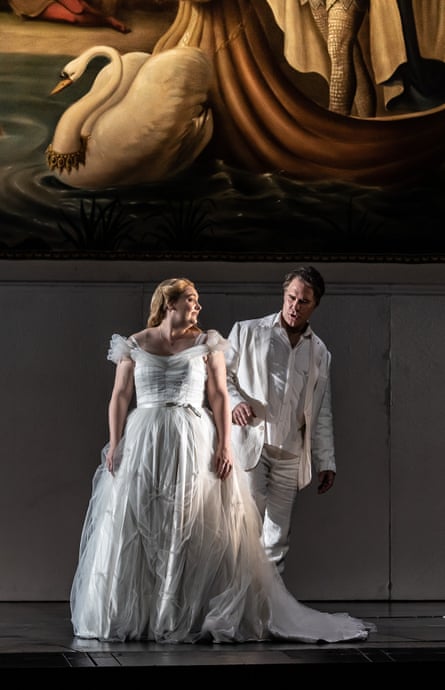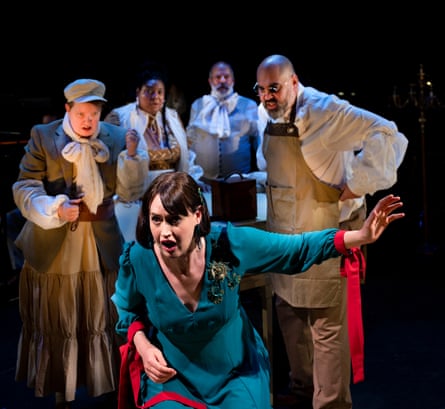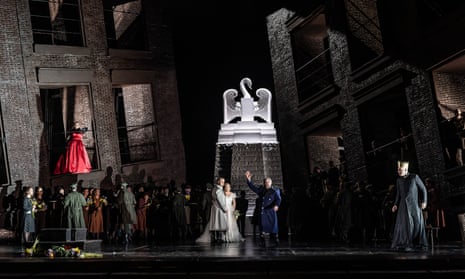The swan-swastika banners, boots and guns in the Royal Opera’s 2018 staging of Wagner’s Lohengrin, though brilliantly done, had an air of theatrical platitude when new. Now back for its first revival, with an outstanding, watertight cast conducted by Jakub Hrůša, David Alden’s production has sharp immediacy. Empty facades of burnt-out buildings, which previously resembled bleak but elegant examples of constructivism in Paul Steinberg’s designs, now reflect the images we see daily in the news. A herald in leg brace, face bloodied, holds up a mirror to our tarnished world.
Lohengrin (1850), a transitional work for Wagner in his long journey towards The Ring and Parsifal, is set against a backdrop of war. That tumult recedes in the face of the tangled principal relationships, chief among them Elsa von Brabant (Jennifer Davis, returning to the role in gleaming voice) and her saviour-hero of the title, performed with expressive range, and no fear of singing softly, by Brandon Jovanovich. As a knight of the holy grail, he is obliged to travel by swan boat. Nor must he reveal his name, even to his understandably frustrated new wife.

He arrives as Elsa’s liberator, the city walls splitting open at the breathtaking climax of Act 1, to a flutter of wings (video by Tal Rosner) suggesting a swan in flight. Out steps the mysterious knight, into this war zone, an outsider in loose white linen suit (cast your mind back to the BBC correspondent Martin Bell entering Bosnia). Lohengrin, however, is an aggressor too, showing an aptitude for violence when he and Elsa tumble on the marital bed, and willing to kill his grisly opponent Telramund. When the stranger finally speaks his name, it is, in every sense and after four hours of high-intensity opera and many blazing, onstage trumpet fanfares, curtains.
The vital crowd scenes in Lohengrin act as interruptions, sonically and dramatically, to the dominant exchange between the the lead couple and their pagan opponents, Ortrud and Telramund – the explosive and steely Anna Smirnova and Craig Colclough, powerfully efficient as her murky accomplice. On Tuesday’s first night, the choral outbursts had particular urgency and attack, strenuous high tenor lines belted out with accuracy, tone and assurance, a wall of glorious sound hitting the back of the auditorium. This is a chorus in peak form.
Alden’s direction (revived by Peter Relton) is meticulously choreographed, not only for the multitudes but in the movement of each individual, patterned by position on stage and use of colour (red, white, black, emphasised by Adam Silverman’s lighting and use of shadow). This stylised approach could have been stifling. Instead, it helped clarify. Gábor Bretz as the weak king and Derek Welton, luxury casting as Herald, led a strong supporting ensemble. Hrůša’s perceptive conducting ignited red-hot playing from the ROH orchestra, violins digging into their strings as if electrically charged, clarinet and oboe eloquent in solos, brass on fire and willing to risk safety. This is not the best of Wagner, but it was Lohengrin at its best.
Applying the lightest touch, the team of composer Errollyn Wallen, with director Jenny Sealey and co-librettists Selina Mills and Nicola Werenowska, have created a cabaret-style opera about the life of Maria Theresia von Paradis. This Austrian musician and contemporary of Mozart lost her sight as a child, and was subjected to invasive cures and unwanted sexual attentions. Wallen’s innovative work has been staged by Graeae theatre company, founded in 1980 to champion deaf, disabled and neurodivergent talent. The opera’s central relationship is between Paradis and her mother, the Baroness, who sees only her daughter’s shortcomings, not her extraordinary gifts.

The Paradis Files skips through Theresia’s story, a mix of fact and fiction, in quick scenes, using six singers and five musicians who perform Wallen’s airy score, a kaleidoscope of 18th-century riffs and catchy, pop-style rhythms. The music offers vocal scope to Bethan Langford, outstanding in the central role, with Maureen Braithwaite, as her mother, and Ella Taylor, as the maid Gerda, leading the cast. With onstage signing as part of the action, and wittily designed surtitles, The Paradis Files ensures that a new audience has a chance to experience opera. The response at the Queen Elizabeth Hall was cheerful and euphoric.
Star ratings (out of five)
Lohengrin ★★★★★
The Paradis Files ★★★★
Lohengrin is at the Royal Opera House, London, until 14 May
The Paradis Files tours the UK until 12 May

Comments (…)
Sign in or create your Guardian account to join the discussion